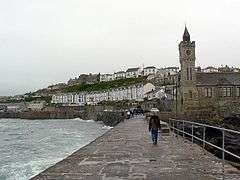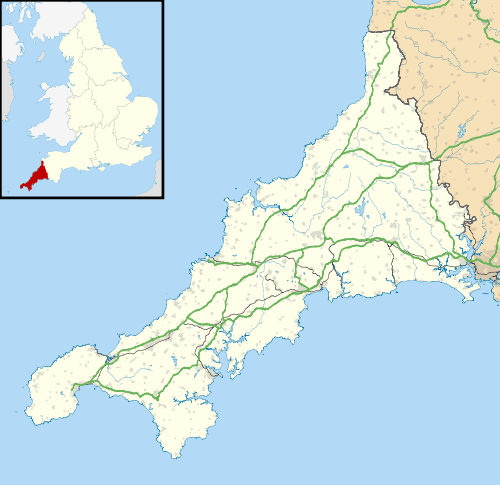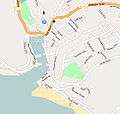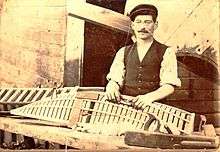Porthleven
| Porthleven | |
| Cornish: Porthleven | |
 Porthleven Harbour |
|
 Porthleven |
|
| Population | 3,094 (2011) |
|---|---|
| OS grid reference | SW6225 |
| Civil parish | Porthleven |
| Unitary authority | Cornwall |
| Ceremonial county | Cornwall |
| Region | South West |
| Country | England |
| Sovereign state | United Kingdom |
| Post town | HELSTON |
| Postcode district | TR13 |
| Dialling code | 01326 |
| Police | Devon and Cornwall |
| Fire | Cornwall |
| Ambulance | South Western |
| EU Parliament | South West England |
| UK Parliament | St Ives |
Coordinates: 50°05′02″N 5°18′54″W / 50.084°N 5.315°W
Porthleven (/ˌpɔːrθˈlɛvən/) is a town, civil parish and fishing port near Helston in Cornwall, England, United Kingdom. It is the most southerly port on the island of Great Britain,[1] and was originally developed as a harbour of refuge, when this part of the Cornish coastline was recognised as a black spot for wrecks in days of sail. Nearby Loe Bar was particularly infamous, with swimmers and surfers being warned off the area to this day. Porthleven has many large areas of social and council housing. An electoral ward called Porthleven and Helston South also exists. The population at the 2011 census was 4,024.[2]
History and geography
Discover Porthleven – an online museum – was created in 2015 as an ongoing community project. Its aim is to record all Porthleven's history. Large amounts of images and text are being received from around the world as well as from local residents. Once up to date it is hoped to start recording history in the making as tomorrow makes today history. The museum also has a large pictorial display at Out of the Blue Porthleven.
An index of archives can be accessed on the home page. Everything is being created in volumes of e-books. Individuals can create their own log in details and submit their own history.[3]
Historically and for local government purposes, Porthleven was included within the town boundaries of nearby Helston. After years of growth, it now has its own town council. Its population recorded by the United Kingdom Census 2001 was 3,190.[4] Including tourists and surfers would swell that number considerably.
Until 1844 Porthleven was within the parish of Sithney; the parish church of St Bartholomew was built in 1842. The name Porthleven is probably connected with St Elwen or Elwyn, whose chapel here existed before 1270. It was rebuilt c. 1510 but was destroyed in 1549. There were also chapels at Higher Penrose and Lanner Veor (the latter founded in 1377) and a holy well at Venton-Vedna.[5]
Porthleven has exploited its location and exposure to powerful swells to become one of the best-known and highly regarded surfing spots in Britain. Waves, often exceeding 6.6 feet (2.0 m), break on the shallow reef that was shaped by blasting the harbour. Due to the prevailing westerly winds it was very easy for a ship under sail to get trapped in the bay and be cast up on the rocks at the small fishing coves of Mullion, Kynance and the Lizard.
Porthleven's most recognisable building is the Bickford-Smith Institute next to the pier and harbour entrance. With a tower about 70 feet (20 metres) high, it looks like a church but currently is used as a snooker club and houses the town council offices. It featured (along with various other scenes from the town) as the incident room in an episode of the TV detective series Wycliffe. A picture of the building against a large breaking wave sometimes appears in the background of BBC UK weather forecasts, particularly when windy conditions and rough seas are expected.
The Royal National Lifeboat Institution stationed a lifeboat at Porthleven in 1863. A boat house was built at Breageside from where the boat was taken to the water on a carriage. A new boat house on the west side of the harbour entrance was opened in 1894 with a slipway to make launching easier. The station was closed in 1929 as the neighbouring stations at The Lizard and Penlee had been equipped with motor lifeboats that could cover the whole of Mount's Bay. The slipway was dismantled and the boat house was used as a store for a while but has since become the Shipwreck Centre museum.[6]
Protected areas
Porthleven lies within the Cornwall Area of Outstanding Natural Beauty (AONB). Almost a third of Cornwall has AONB designation, with the same status and protection as a National Park.
There are four Sites of Special Scientific Interest (SSSI) sites close to Porthleven. Three of them, Porthleven Cliffs SSSI, Porthleven Cliffs East SSSI and Wheal Penrose SSSI are also Geological Conservation Review (GCR) sites. The ″Giant’s Rock″, within Porthleven Cliffs SSSI, is an erratic of unknown origin and unknown mode of transport to its present site near the entrance of Porthleven harbour. The Wheal Penrose SSSI is a disused lead mine 550 yards (500 m) to the south with "good examples of typical lead zone mineralisation".[7][8][9] The fourth Loe Pool SSSI is Cornwall's largest natural lake formed by a barrier beach, known as Loe Bar, which dams the River Cober.[10]
Methleigh
Methleigh was the site of a fair and annual market from the year 1066.[11][12]
After the Norman Conquest the Bishop of Exeter held the manor of Methleigh but the Earl of Cornwall possessed the fair. At the time of the Domesday Survey there were 15 acres (6.1 ha) of arable land, 40 acres (16 ha) of pasture and 60 acres (24 ha) of underwood. The population consisted of 15 villeins, 4 smallholders and 3 serfs.[13]
Beach area
Porthleven beach lies to the east of the town adjacent to the harbour and near Porthleven village centre. RNLI lifeguards patrol it during the holiday season.[14] The beach is separated from the harbour by a granite pier, which stands in front of the Porthleven institute and clock tower. When the tide is out it is possible to walk in an easterly direction along Porthleven beach for approximately three miles. There is also a coastal path with views of the beach below.
Sport and leisure
Surfing is very popular at Porthleven and nearby Praa Sands. Porthleven has been described as "Cornwall's best reefbreak".[15] Kayaking is also popular due to the slipway from within the harbour and access via surrounding beaches.
Porthleven Bowling Club is based at Gala Park, Methleigh Parc in Helston. It is affiliated to Bowls Cornwall and Bowls England. The club was founded in 1959 and has lawn bowling and short-mat bowls facilities. There are in-house competitions for men and women. The club competes against other clubs and individuals within West Cornwall, Cornwall and nationally. The website is www.porthlevenbowlingclub.co.uk
Porthleven has a Non-League football club Porthleven F.C. who play at Gala Parc
The restaurateur Rick Stein has a restaurant in the town.[16]
Twinning
Porthleven is twinned with Guisseny (Gwiseni) in Brittany, France.[17]
Notable residents
Porthleven was the birthplace of the Victorian theologian and religious writer Pender Hodge Cudlip and of David Jewell, a prominent British independent school headmaster during the late 20th century.[18]
Porthleven was the home town of the Dambusters' Commanding Officer, Guy Gibson, and there is a road named in his memory. Former motor racing driver Chris Craft, who competed in the 24 Hours of Le Mans race for over a decade, including a third-placed finish in 1976, as well as two races in Formula One, was born in Porthleven.
Gallery
 OpenStreetMap of Porthleven
OpenStreetMap of Porthleven Sunset behind Porthleven clock tower and overlooking Mount's Bay
Sunset behind Porthleven clock tower and overlooking Mount's Bay Waves hitting the Pier
Waves hitting the Pier Porthleven Harbour
Porthleven Harbour

References
- ↑ "Cornwall Online - The Lizard Peninsula Guide". Lizard-peninsula.co.uk. Archived from the original on 2 May 2016. Retrieved 2016-10-19.
- ↑ "Porthleven and Helston South - UK Census Data 2011". Ukcensusdata.com. Retrieved 2016-10-19.
- ↑ "Porthleven Museum Archives". Porthlevenmuseum.org.uk. Retrieved 2016-10-19.
- ↑ "Archived copy". Archived from the original on 25 May 2006. Retrieved 2006-01-19.
- ↑ Cornish Church Guide (1925). Truro: Blackford; p. 185
- ↑ Leach, Nicholas (2006) [2000]. Cornwall's Lifeboat Heritage. Chacewater: Twelveheads Press. pp. 37–38. ISBN 0-906294-43-6.
- ↑ "Porthleven Cliff" (PDF). Natural England. 27 June 1986. Archived from the original (PDF) on 24 October 2012. Retrieved 27 October 2011.
- ↑ "Porthleven Cliffs East" (PDF). Natural England. 1990. Archived from the original (PDF) on 24 October 2012. Retrieved 27 October 2011.
- ↑ "Wheal Penrose SSSI" (PDF). Natural England. 1993. Archived from the original (PDF) on 2 January 2014. Retrieved 27 October 2011.
- ↑ "Loe Pool" (PDF). Natural England. 1986. Retrieved 28 October 2011.
- ↑ "Cornwall | British History Online". British-history.ac.uk. Retrieved 2016-10-19.
- ↑ "Parishes: Botus-Fleming - St Burian | British History Online". British-history.ac.uk. 2016-10-14. Retrieved 2016-10-19.
- ↑ Thorn, C., et al., eds. (1979) Cornwall. (Domesday Book; 10.) Chichester: Phillimore; entry 2,2
- ↑ "Porthleven Beach". Rnli.org. Retrieved 2016-10-19.
- ↑ "Porthleven Spot Guide - Surf Forecast and Report". Magicseaweed.com. Retrieved 2016-10-19.
- ↑ "Rick Stein's restaurant in Porthleven". Rickstein.com. 2015-09-01. Retrieved 2016-10-19.
- ↑ "Archived copy". Archived from the original on 3 October 2011. Retrieved 2008-05-07.
- ↑ Bates, Stephen (13 July 2006). "Obituary: David Jewell". The Guardian.
External links
| Wikivoyage has a travel guide for Porthleven. |
- Porthleven at DMOZ
- Porthleven Old Cornwall Society
- Porthleven Online
- Cornwall Record Office Online Catalogue for Porthleven
- Methleigh; Vision of Britain
- Porthleven at DMOZ